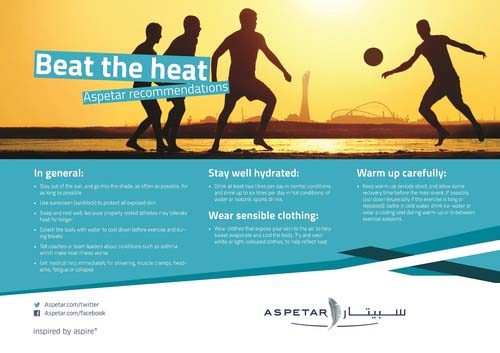
As Qatar braces for an increase in heat and humidity this month, Hamad Medical Corp. has said it expects the number of patients suffering from heat exhaustion to rise from 10 people per week to 10 a day over the next few months.
To avoid landing in the hospital, Dr. Saad Abdulfattah Al Nuaimi, senior consultant at HMC’s Emergency Department, offers these tips:
- Increase fluid intake to stay hydrated and replenish water the body loses due to excessive sweating. Avoid drinks containing caffeine or alcohol, which can have a dehydrating effect.
- Consider eating small snacks throughout the day and avoiding heavy meals and hot food, as these can increase the body temperature. To replenish salts and minerals lost through excessive sweating, consume snacks with salt in them or fruit juices (though consult your doctor if you have been advised to take a low-sodium diet).
- Stay indoors as much as possible. Avoid going out between 10am and 3pm when the temperature is at its peak.
- Those exercising outdoors should start slowly to allow the body to acclimatize to the hot weather. Anyone with an erratic pulse or who feels excessively tired should stop exercising for that day, rest in the shade and take plenty of fluids.
- Never leave infants, children or pets unattended in a parked car, as temperatures can rapidly rise inside the vehicle.
- Keep an eye on the vulnerable, such as elderly people, young children and babies, and those who are obese or who have chronic illnesses such as diabetes and hypertension.

HMC offered a similar set of pointers last year, as well as definitions of heat stroke and when to seek help.
Aspetar at the Aspire Zone adds that those who are outdoors should dress sensibly, and quit working out when they experience muscle cramps, shivering, headache or fatigue.
Thoughts?
Note: Story edited to change headline and lead paragraph, replacing “heatstroke” with “heat exhaustion.” HMC points out that cases of heatstroke are rare, even in the summer, at around two a month.
Credit: Photo by Jeff Epp







